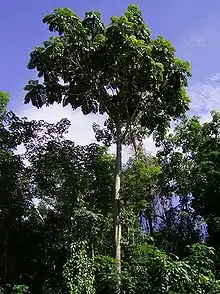| Entawak | |
|---|---|
 | |
| Entawak in East Kalimantan, Indonesia | |
| Scientific classification | |
| Kingdom: | Plantae |
| Clade: | Tracheophytes |
| Clade: | Angiosperms |
| Clade: | Eudicots |
| Clade: | Rosids |
| Order: | Rosales |
| Family: | Moraceae |
| Genus: | Artocarpus |
| Species: | A. anisophyllus |
| Binomial name | |
| Artocarpus anisophyllus | |
| Synonyms | |
|
A. klidang Boerl. (1900) | |
Artocarpus anisophyllus, the entawak or mentawa, is a tropical tree in the Moraceae. It is native to the central parts of Southeast Asia, and is present in Peninsular Malaysia, Sumatra, Borneo and the intervening islands. It is called popwan in Palawan, Philippines.
It bears round, 3–4 inch long, brownish yellow fruit. The entawak's flesh is orange-red and may taste like a pumpkin in flavor, while it also has edible seeds which are commonly roasted and salted to be eaten. Rarely cultivated in its native range, it is a large rainforest tree growing up to 45 metres. The fruit is eaten fresh and its propagation is by seed. It is a distant relative to the wellknown jackfruit and breadfruit, besides the tasty tarap fruit to which it is closely related. It is propagated by seeds, grafting and cuttings besides other viable methods. While it grows exceedingly well in tropical climates, it is not as well-adapted to subtropical climates. When grown from seed the germination may take 1–3 months and it will probably bear fruit within 8–9 years. It cannot survive temperatures below 50 °F (10 °C) and requires temperatures higher than 70 °F (21 °C) to flourish.
Gallery
_(8082546991).jpg.webp) foliage
foliage.jpg.webp) foliage and fruit
foliage and fruit collected fruit
collected fruit
See also
References
- ↑ Chadburn, H. (2018). "Artocarpus anisophyllus". IUCN Red List of Threatened Species. 2018: e.T86528589A86528596. Retrieved 14 April 2022.
